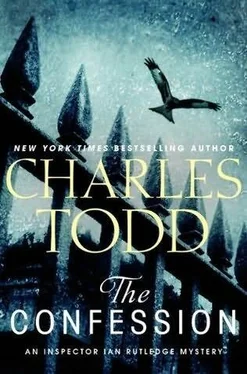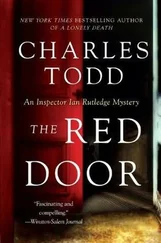Charles Todd - The Confession
Здесь есть возможность читать онлайн «Charles Todd - The Confession» весь текст электронной книги совершенно бесплатно (целиком полную версию без сокращений). В некоторых случаях можно слушать аудио, скачать через торрент в формате fb2 и присутствует краткое содержание. Жанр: Полицейский детектив, на английском языке. Описание произведения, (предисловие) а так же отзывы посетителей доступны на портале библиотеки ЛибКат.
- Название:The Confession
- Автор:
- Жанр:
- Год:неизвестен
- ISBN:нет данных
- Рейтинг книги:5 / 5. Голосов: 1
-
Избранное:Добавить в избранное
- Отзывы:
-
Ваша оценка:
- 100
- 1
- 2
- 3
- 4
- 5
The Confession: краткое содержание, описание и аннотация
Предлагаем к чтению аннотацию, описание, краткое содержание или предисловие (зависит от того, что написал сам автор книги «The Confession»). Если вы не нашли необходимую информацию о книге — напишите в комментариях, мы постараемся отыскать её.
The Confession — читать онлайн бесплатно полную книгу (весь текст) целиком
Ниже представлен текст книги, разбитый по страницам. Система сохранения места последней прочитанной страницы, позволяет с удобством читать онлайн бесплатно книгу «The Confession», без необходимости каждый раз заново искать на чём Вы остановились. Поставьте закладку, и сможете в любой момент перейти на страницу, на которой закончили чтение.
Интервал:
Закладка:
Rutledge did. Bowles was pleased to take over the inquiry, bring it to a swift and certain end, and put his opposite number’s nose out of joint.
An hour later, Rutledge was on his way to Essex.
This time he didn’t have Frances to keep him company. This time it was Hamish. Although the sun was shining and the day was fair, the journey seemed to drag, and he would have sworn that Furnham was twice as far as it had been earlier.
He’d decided that perhaps the place to begin his inquiries was with the clergyman in charge of the isolated church that he and Frances had seen. It was roughly halfway between the deserted house at River’s Edge and the village of Furnham. If anyone knew something about Russell’s background, it would likely be the man who had ministered to his family.
As he passed the gates to the estate, he wondered again why Russell had deserted it. Because of his wife’s death? Or because he had committed murder there and got away with it? Until someone had found him out and come for him.
An eye for an eye.
Ahead he could just see the peaked roof of the church, standing out like a sentinel in the long reaches of the marshes. The grasses had more color today, varied in texture as well as shade, and the river beyond was intensely blue as it mirrored the sky. And yet the warm late summer’s day was chilled by the whispers of the wind through the grasses, setting them to move and rustle, as if hidden among them were crowds of people talking together.
Frances had noted it as well, but alone now, he realized that it was defining this place in a way that he hadn’t expected.
As if I’m being watched, Frances had said.
It would tend, he thought, to make a man with a guilty conscience nervous. Was that why the house stood empty? The whispers that a man’s mind turned to accusation?
He drew up before the church. He had no idea where to look for the Rectory, although there must be one. But with luck, he might find someone inside who could direct him.
The sign announcing that this was the Church of St. Edward the Confessor had a new message today on the hoarding below: Seek and ye shall find. He will welcome all who come to Him.
Rutledge hoped that a welcome would prove to be true. It had not in Furnham.
He opened the door, listening to the squeal of rusty hinges as he stepped into the plain, Victorian interior.
“Ye willna’ have to seek anyone. Yon caterwauling will bring them running.”
And Hamish was right. A door at the rear of the sanctuary opened and a man stepped through.
He was wearing a clerical collar and an anxious expression on his square, sun-browned face. It was difficult to judge his age. He was one of those men who would appear boyish well into their forties. Rutledge found himself thinking that this must be a drawback for a clergyman trying to project an image of experience and wisdom.
He didn’t come forward. He merely stopped where he was, seeing a stranger, and asked in a strong voice that belied his anxiety, “Are you lost?”
“Mr. Morrison? I’m from London. Scotland Yard. I’d like to speak to you about one of your parishioners.”
“Indeed?” It was a question, not a statement. “We have the usual number of reprobates here, but I can’t recall that any of them has lately come to the attention of Scotland Yard.”
“Is there somewhere we could talk?” Rutledge asked.
The man gestured to the pews that filled the sanctuary. “There are seats aplenty here. Shall we take one of them?”
Rutledge walked forward, and the other man didn’t move until he had come to the last row but one. “Will this do?”
“Yes. Thank you.” The man stepped forward and finally held out his hand. “I’m afraid you have the advantage of me.”
“Inspector Rutledge.”
“Ah. Well, Mr. Rutledge, I must confess that I’m not in the confidence of many of my flock, but I’ll do what I can to help.”
They sat down on the hard wood of the pew, facing each other. Rutledge reached into his pocket and took out the locket on its delicate chain. Opening it, he held it out, but he already knew the answer to his question before he asked it. “Do you know this woman?”
“Yes. Yes, I did,” Morrison replied slowly, reaching for the locket, although it was clear he didn’t require a closer look. “She once lived nearby.”
“Could you tell me her name?”
“Where did you find this locket? May I ask?”
“In Gravesend,” Rutledge answered. When the rector said nothing more, his eyes on the photograph, Rutledge added, “The police found it around the neck of a body taken from the Thames.”
“Dear God!” The rector closed the locket with a snap, as if he couldn’t bear to look at it any longer. He turned his gaze toward the altar. “Who-has the body been identified?”
“We have reason to believe that it is, was, one Wyatt Russell.”
The relief filling in the rector’s eyes was almost painful to watch. Rutledge looked away. “Did you know him?” he asked.
“I-yes, I knew him. He lived not far from here.”
“At River’s Edge, in fact.”
“Yes, how did you know?”
“He came to see me shortly before his death. You haven’t told me who the woman is.”
“Was he a suicide?”
“He was murdered,” Rutledge replied shortly. “What is her name, Rector?”
“God rest his soul,” Morrison said fervently, crossing himself. “As to the woman in the photograph, her name is Cynthia Farraday. She came to live at River’s Edge when her parents died of typhoid. Her father and the late Malcolm Russell were cousins, I believe. She was too young to live on her own, and Mrs. Russell, his widow, was made her guardian. She was alive then. Mrs. Russell, I mean. Wyatt’s mother. And then one day in the summer of 1914-August, it was-Mrs. Russell simply disappeared. ”
“Were the police called in?”
“Yes, the police from Tilbury. When it was realized that she was missing, there was a frantic search for her by the family and the staff. And then someone was sent posthaste to Tilbury. Men were brought out from Furnham to help, because they knew the marshes so well. But she was never found. The inquest concluded that she had drowned herself, for fear her son would die in the war. She’d lost her husband in the Boer War. Her son remembered that when she was a girl, a gypsy had read her hand and predicted that war would take all she loved from her. Her husband’s death convinced her that the prediction was true.”
There had been a great deal of speculation that summer, after the Austrian archduke and heir to the Hapsburg throne had been assassinated in Sarajevo. Rutledge remembered it well. Would Austria demand a reckoning with the Serbs? And what would Germany do, if Russia insisted on protecting her fellow Slavs? Would France be drawn in, as an ally of Russia? Governments began to mobilize. And in the end, armies began to march. And Belgium, tiny Belgium with open borders and only a small army, had been overrun by the Kaiser’s forces on their way to France, in spite of Britain’s pledge to protect her. Britain had had no choice then but to declare war on Germany. And all Europe burst into flame.
No one had believed it would happen. And then everyone had believed that it would all be over by Christmas, that the heads of state would come to their senses.
Instead, the war had dragged on for four bloody years. Mrs. Russell had had every reason to be afraid for her son, although no one could have guessed it at the time.
“Was this a strong enough reason for her to kill herself? Surely further inquiry would uncover a better motive for her disappearance? And I should think that if she had drowned, sooner or later her body would have surfaced?”
“You didn’t know her,” Morrison said wearily. “Elizabeth Russell was obsessed with the news, reading everything she could find. She had daily newspapers sent down from London by special messenger. She corresponded with a friend who’d married a Frenchman, and a telegram was sent telling her when the Germans had marched. And in spite of everything, her son joined the Army not a fortnight after she vanished.” He shrugged. “The local people, in their wisdom, were just as glad she hadn’t been found. The stigma of suicide, you see, and where to bury the body. They put up quite a fuss even when Russell wanted to set up a memorial to his mother in the family’s mausoleum. I must say, that surprised me. Furnham is not a very religious parish, as a rule.”
Читать дальшеИнтервал:
Закладка:
Похожие книги на «The Confession»
Представляем Вашему вниманию похожие книги на «The Confession» списком для выбора. Мы отобрали схожую по названию и смыслу литературу в надежде предоставить читателям больше вариантов отыскать новые, интересные, ещё непрочитанные произведения.
Обсуждение, отзывы о книге «The Confession» и просто собственные мнения читателей. Оставьте ваши комментарии, напишите, что Вы думаете о произведении, его смысле или главных героях. Укажите что конкретно понравилось, а что нет, и почему Вы так считаете.












